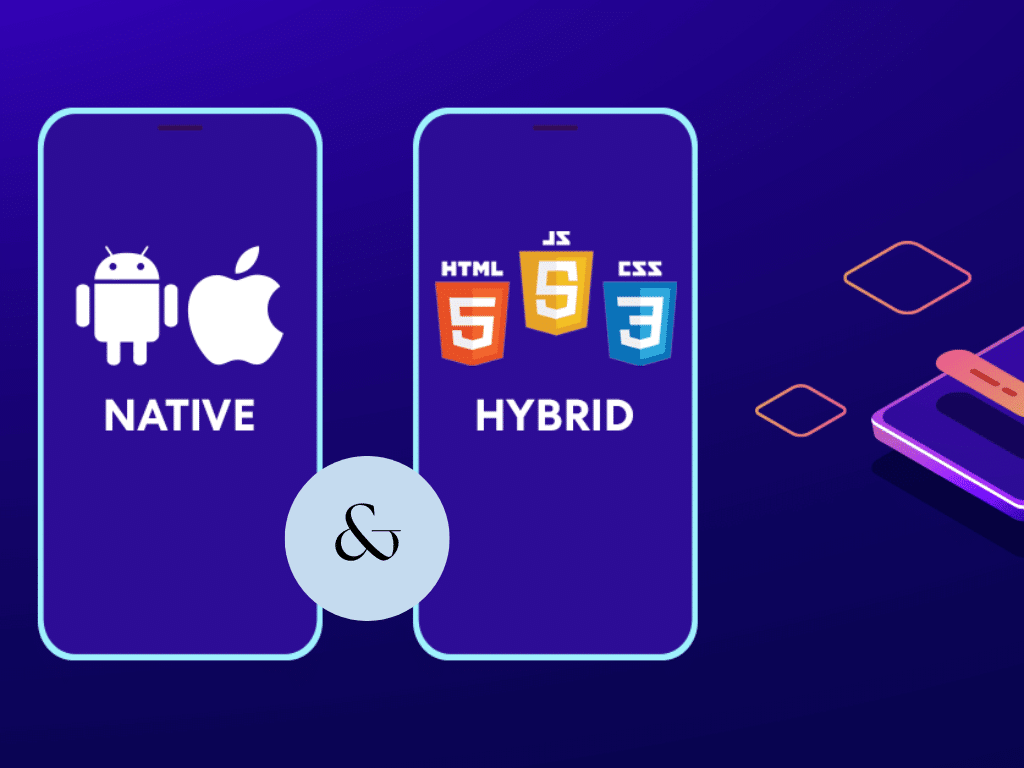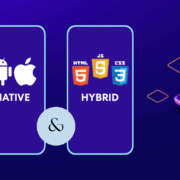Comparing Native and Hybrid Mobile Application Development Services for Performance Gains
On one side where mobile applications are redefining convenience for users, they are acting as a dynamic business tool for organizations on the other side.
There’s no doubt that mobile applications have become the standard for businesses to connect with their customers. However, mobile apps are all about a seamless user experience and unmatched performance.
While users crave high-performing mobile apps, businesses struggle to choose the right development approach that can deliver faster, smoother, and more reliable apps across platforms. In the end, it all comes down to one crucial decision—choosing between native and hybrid mobile application development services.
So, how would you select the best one for your mobile application?
Should you focus on tailored performance with native development, or embrace cross-platform flexibility with multiplatform mobile app development?
This blog dissects both approaches with an in-depth comparison of their advantages and disadvantages, helping you choose the most suitable method based on performance gains, cost-efficiency, and faster time-to-market.
What is Native Mobile Application Development?
Native mobile application development refers to the process of creating mobile apps specifically for a particular platform, such as iOS or Android. These apps are carefully developed using programming languages specific to the operating system, such as Java or Kotlin for Android and Swift or Objective-C for iOS.
Unlike multiplatform mobile app development, natively developed applications rely more on a device’s hardware and software features. This enables businesses and developers to leverage the advanced features of operating systems and fully utilize the unique capabilities of modern digital devices like smartphones and tablets.
Advantages of Native Mobile Application Development
Let’s take a look at some of the prominent advantages that native mobile application development offers over cross platform app development services:
Superior Performance: Native apps are optimized for the platform they are built for, ensuring faster load times, smoother navigation, and better responsiveness.
Access to Device Features: Native apps can easily access device features like the camera, GPS, and push notifications, ensuring a seamless user interaction.
Scalability: Since native apps are built specifically for each platform, they are more scalable and flexible when adding new features or functionalities.
Disadvantages of Native Mobile Application Development
Apart from its notable advantages, native mobile application development also comes with some disadvantages that businesses must consider:
Limited Code Reusability: Native application development for different platforms requires writing separate code for each platform, which makes it non-reusable.
Longer Development Time: Since native apps are built individually for each platform, the development process can take longer as compared to hybrid mobile application development services.
Higher Cost: Developing separate apps for iOS and Android can increase development costs, as it requires building and maintaining two codebases.
What is Hybrid Mobile Application Development?
Hybrid or multiplatform mobile app development refers to the process of creating a single, unified application that works across different platforms and combines the best of both native and web solutions. In hybrid mobile application development, businesses only have to create a single codebase for different platforms.
Hybrid mobile apps are developed using web technologies like CSS, HTML5, and JavaScript, and then wrapped in a native shell using frameworks like ReactNative, Flutter, and Ionic. Thus, hybrid apps deliver performance and user experiences to native apps but are more cost-efficient and lightweight.
Advantages of Hybrid Mobile Application Development
Similar to native mobile application development, hybrid mobile application development services also come with their unique advantages:
Cost-Effective: Hybrid apps are generally more cost-effective because a single codebase can be used for multiple platforms, reducing development time and costs.
Faster Development: With a shared codebase, businesses can build and deploy hybrid mobile applications much faster as compared to native applications.
Cross-Platform Compatibility: Cross platform app development services create applications that can run on both iOS and Android platforms easily.
Disadvantages of Hybrid Mobile Application Development
Although the advantages of hybrid mobile app development make it an attractive choice, there are some disadvantages that must be considered:
Performance Limitations: While hybrid mobile application development suits well for most use cases, it may not match the needs of high-performance apps like games.
Limited Access to Device Features: Hybrid apps may not have full access to all native device features, limiting certain features and functionalities.
User Experience: Hybrid apps may not always offer the same level of user experience as native apps, as they don’t follow platform-specific UX/UI guidelines.
Comparing Native vs. Multiplatform Mobile App Development
The debate between native and hybrid mobile application development services is not new among businesses. The unique advantages and disadvantages of both these development approaches often confuse business owners and stakeholders when it comes to choosing one for their next application development project.
Hence, let’s compare native and hybrid mobile application development based on some important factors to find out which one is best for you:
Performance
When it comes to performance, the most important aspect of modern mobile apps, native development outperforms hybrid mobile app development. This is largely because native applications use the hardware and software capabilities of devices.
Cost-Efficiency
Opposite to performance-based comparison, hybrid mobile app development proves to be more cost-effective and affordable as compared to native development. The single codebase of hybrid apps significantly reduces coding and development costs.
Time-to-Market
Due to the single codebase for different platforms, a hybrid mobile application development takes less time as compared to native app development. It means that hybrid mobile apps have a faster time-to-market and can be deployed quickly.
Features and Functionalities
Native mobile application development stands out from the hybrid approach in terms of features and functionalities. Native mobile apps offer a wide range of features and robust functionalities due to their better access to device platform and hardware.
User Experience
While both native and hybrid mobile applications stand close in terms of user experience, native mobile apps often deliver a better UX. Hybrid apps also deliver a decent user experience but may not match the standards of native applications.
Maintenance
Cross platform app development services offer easier maintenance and better flexibility for updates due to the single codebase. While maintaining native apps is an extensive process as changes have to be made according to the platform.
Which One Should You Choose?
Ultimately, when it comes down to choosing the best approach for your business, out of native mobile app development and cross platform app development services, there’s no one-size-fits-all answer. The right choice depends on your business and your budget, your goals, project’s complexity, and available timeline.
If you want to build a feature-rich app that delivers unmatched performance and user experience, native mobile application development can be the right choice. On the other hand, if you are looking for a cost-effective option and want to step into the market quickly, you should go with hybrid mobile application development services.




